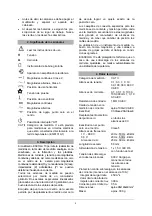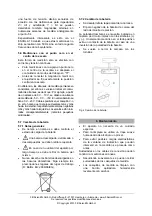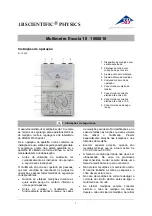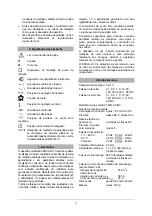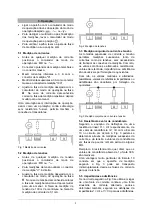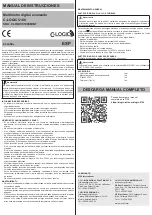
3B Scientific GmbH
▪
Rudorffweg 8
▪
21031 Hamburg
▪
Germany
▪
www.3bscientific.com
Subject to technical amendments
© Copyright 2013 3B Scientific GmbH
ing the definitions for impedance
Z
=
U
/
I
and
admittance
Y
=
I
/
U
means that AC measure-
ments can also be measured in a variety of
ranges in a similar way to the DC quantities in
5.4.
The Escola 10 is particularly useful in this re-
spect because it allows for measurements to be
made not only at 50 Hz, but right across the low-
frequency range.
5.6 Measurements with the zero point of the
needle centred
This kind of measurement can only be made in
DC ranges.
•
To make a measurement with the zero point
in the centre, push the mode switch to
.
•
Before measuring the external quantity,
calibrate the zero point using the trimmer to
set the point in the direct centre of the scale.
The full extent of the measuring remains avail-
able so there is no separate labelling for the
range selector switch.
For a range 0 V ... 10 V, for example, the limits
now become -5 V ... 0 V ... +5 V absolute or 0 V
... ±5 V. Positive values of voltage at the V
socket or current at the A socket cause the nee-
dle to move to the right while negative values
cause it to move to the left. The scales are la-
belled accordingly (smaller auxiliary numbering).
5.7 Changing the battery
5.7.1 General information
•
From time to time, check the state of the
battery.
•
Remove discharged or corroded bat-
teries from the apparatus.
•
During prolonged periods of disuse,
also remove the battery from the apparatus.
•
Do not dispose of the battery in the regular
household garbage. Follow the local regula-
tions (In Germany: BattG; EU: 2006/66/EG).
5.7.2 Changing the battery
•
Unscrew the back of the chassis.
•
Place the negative pole of the battery on the
spring.
The polarity is also marked on the board with
plus and minus symbols. Additionally, a me-
chanical clip on the positive side prevents bat-
tery contact when polarity is reversed.
•
Close chassis again.
Fig. 4 Changing the battery
6. Maintenance
•
This apparatus does not require special
maintenance.
•
For cleaning, use a soft cloth, slightly mois-
tened with alcohol, or a brush.
•
In order to remove a potential electrostatic
charge from the meter display window,
which can easily influence measurements,
follow the instructions above.
Dirt or moisture in the measurement sockets can
affect readings.
•
Shake out any dirt that may be in the meas-
urement sockets.
•
Soak a new swab with isopropyl alcohol and
work around the inside of each measure-
ment socket.


















